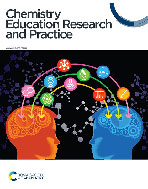Examining the effect of lab instructions on students' critical thinking during a chemical inquiry practical†
Abstract
Developing students’ critical thinking skills is often seen as an important educational goal for inquiry assignments. In this study, we investigated to what extent pre-laboratory activities of a chemical inquiry assignment influence students' independent critical thinking. We compared two forms of pre-laboratory activities that are frequently used in educational practice to prepare students for their inquiry assignments: on the one hand paved road pre-laboratory activities that lead students with sensemaking preparatory questions and on the other, critical-thinking pre-laboratory activities in which students start with the development of an experiment plan using provided information and criteria for a good experimental design. We conducted this study two years in succession in senior year Dutch high school chemistry classes during an inquiry assignment that involved the study of the relation between reaction kinetics and molecular reaction mechanisms of organic nucleophilic substitution reactions (SN1/SN2). We focused on aspects associated with critical thinking, such as the desire to understand what is observed and to be able to adjust an existing method or model on the basis of experimental data. The results show that the design of pre-laboratory activities strongly influence the critical thinking exhibited by students during their inquiry activities, whereby students who perform critical thinking pre-laboratory activities are more motivated to think more deeply about the meaning of their measurements than students that perform paved road pre-laboratory activities.


 Please wait while we load your content...
Please wait while we load your content...